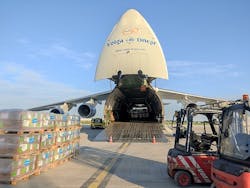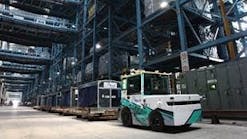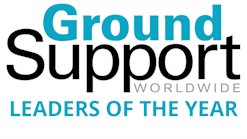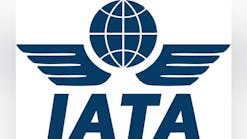Volga-Dnepr Group and Humanitarian Logistics Association Strengthen Joint Health and Humanitarian Connections
Volga-Dnepr Group has signed a Memorandum of Understanding with the Humanitarian Logistics Association (HLA), a non-profit membership association that works to empower humanitarian logistics professionals and organizations around the world with delivering aid more effectively.
The MoU will serve to advance the joint thought leadership activities of the group and the HLA in the humanitarian sector and will support learning and knowledge sharing especially for healthcare delivery.
The group offers the services of its dedicated fleet of over 40 freighters, along with integrated logistics solutions for the sensitive and sophisticated cargo required for delivering crucial humanitarian aid, such as vaccines, medicines, PPE, and medical equipment.
The HLA works closely with its members across aid organizations, and private, public, and academic fields to promote cross-sector cooperation and partnerships for responding to global emergencies.
More recently, with the pandemic leading to the visible increase of the air cargo industry’s impact in ensuring supply chains remain uninterrupted, the Association has significantly strengthened its collaboration with other members of this sector to gather and share knowledge.
The HLA has invited Yulia Celetaria, global healthcare director, and Pauli Immonen, deputy director healthcare, humanitarian and emergency response, to join its Advisory Group. The appointments will allow the group and the HLA to establish a clear basis of collaboration and learning that recognizes the importance of air freight supply chains in humanitarian contexts and in situations of crisis.
Celetaria says: ‘Rapid response is an integral part of humanitarian logistics, whilst healthcare supply chains are more so characterized by effective capacity management, special handling procedures, stringent standards and risk assessments. 2020 has changed the way we treat these two sectors by bringing them closer to each other, and our goal right now is to align them effectively. With the help of leading associations like the HLA, we are building a global community to advance life-saving logistics through knowledge-sharing, regular training and great networking opportunities.’
George Fenton, chief executive of the HLA, added: ‘Over the past two decades, and especially during the COVID-19 pandemic, humanitarian logistics, and supply chain management more broadly, has become a key component of health and humanitarian assistance. Logisticians face many challenges due to the frequency, intensity, and impact of emergencies, but also because cross-sector connections for the profession have been limited. However, there is increasing opportunity to build on synergies that have emerged during the pandemic, and we are incredibly pleased that the Volga-Dnepr Group has recognized the opportunity to collaborate with HLA to support the evolution of the health and humanitarian logistics sector’.
Volga-Dnepr has been collaborating with the HLA since 2019 when the Association took part in a dedicated humanitarian event in Leipzig along with other experts to advance and promote best practices for stakeholders involved in emergency logistics. The group is planning to be a regular participant in HLA events to advocate for air cargo sector commitments in this area.





